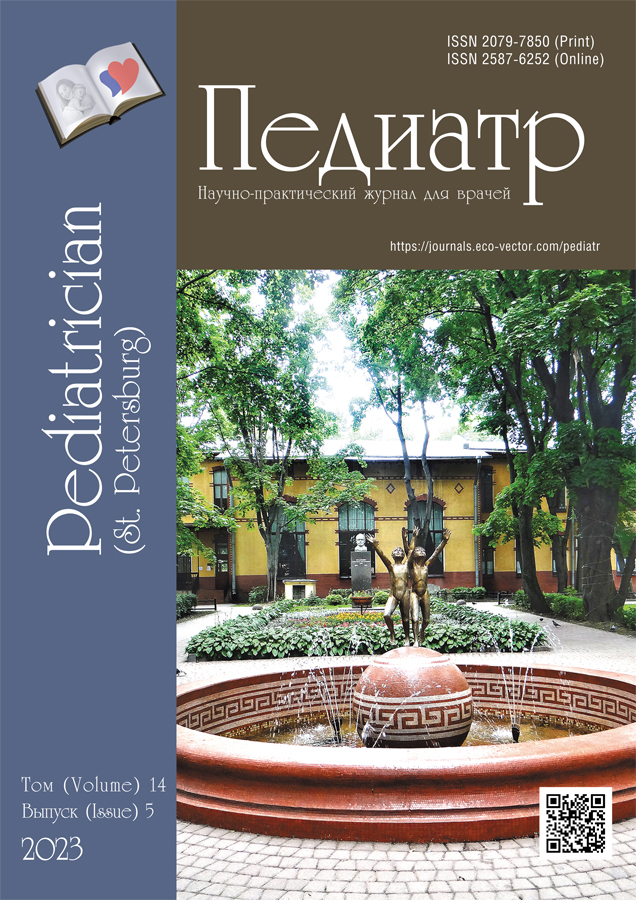Associations between perfectionism and empathy in psychiatry and neurology residents
- Authors: Biletskaya M.V.1
-
Affiliations:
- Saint Petersburg State Pediatric Medical University
- Issue: Vol 14, No 5 (2023)
- Pages: 107-114
- Section: Clinical psychology
- URL: https://journals.eco-vector.com/pediatr/article/view/626013
- DOI: https://doi.org/10.17816/PED626013
- ID: 626013
Cite item
Abstract
BACKGROUND: Empathy is considered a key element in doctor-patient relationship that may positively influence communication and outcomes. However, the correlation of empathy with perfectionism, which prevalence and rates among students are increasing, remains understudied.
AIM: The aim is to study the associations between perfectionism and empathy in psychiatry and neurology residents.
MATERIALS AND METHODS: Psychiatry and neurology residents (n = 100) aged 22–29 filled out the following validated instruments: “Three-Factor Perfectionism Inventory” (N.G. Garanyan, et al.) and “The Interpersonal Reactivity Index (IRI)” (M. Davis). The sample was divided into three groups with high (n = 37), medium (n = 33) and low (n = 30) levels of perfectionism.
RESULTS: Residents with high level of perfectionism have higher level of personal distress (p < 0.01). In this group were also observed significant positive associations between general level of perfectionism and empathic concern (p < 0.05); socially prescribed perfectionism and personal distress (p < 0.05), fantasy (p < 0.05), empathic concern (p < 0.05); perfectionistic cognitive style and personal distress (p < 0.01). In residents with medium level of perfectionism a positive correlation exists between self-oriented perfectionism and perspective taking (p < 0.05). In residents with low level of perfectionism perspective taking negatively correlated with general level of perfectionism (p < 0.01) and self-oriented perfectionism (p < 0.05); a positive correlation exists between socially prescribed perfectionism and personal distress (p < 0.01).
CONCLUSIONS: These findings allow to identify socially prescribed perfectionism and perfectionistic cognitive style, that associated with personal distress, as targets of psychological correction.
Keywords
Full Text
About the authors
Mariya V. Biletskaya
Saint Petersburg State Pediatric Medical University
Author for correspondence.
Email: marbilets@yandex.ru
ORCID iD: 0009-0008-3403-6606
SPIN-code: 9750-9551
Postgraduate Student, Department of Psychosomatics and Psychotherapy
Russian Federation, Saint PetersburgReferences
- Averin VA. Psychology of personality. Saint Petersburg: Mikhailov V.A. Publishing House, 1999. 89 p. (In Russ.)
- Karyagina TD, Budagovskaya NA, Dubrovskaya SV. Adaptation of multyafactor questionnaire empathy M. Davis. Counseling Psychology and Psychotherapy. 2013;21(1):202–227.
- Garanyan NG, Kholmogorova AB, Yudeeva TY. Factor structure and psychometric properties of perfectionism inventory: Developing 3-factor version. Counseling Psychology and Psychotherapy. 2018;26(3):8–32. doi: 10.17759/cpp.2018260302
- Dyachenko EV, Samoilenko NV. Patient-oriented medical consultation. Doctor’s perception of a patient: what can be said about it and how does it affects the interaction efficiency in providing medical care. Medical education and professional development. 2020;11(1):42–50. doi: 10.24411/2220-8453-2020-11002
- Karyagina TD, Kukhtova NV. M. Davis Empathy test: content validity and adaptation in cross-cultural context. Counseling Psychology and Psychotherapy. 2016;24(4):33–61. doi: 10.17759/cpp.2016240403
- Kaurova TV, Mikirtichan GL. The picture of modern pediatrician-dermatologist. From the result of sociologic investigation. Medicine and health care organization. 2018;3(3):52–58.
- Matyushkina EY, Roy AP, Rakhmanina AA, Kholmogorova AB. Occupational stress and burnout among healthcare professionals. Journal of Modern Foreign Psychology. 2020;9(1):39–49. doi: 10.17759/jmfp.2020090104
- Menshchikova AL. The role of egocentrism in development of centration and the decentration features of the physician’s personality. Pediatrician (St. Petersburg). 2013;4(1):109–114. doi: 10.17816/PED41109-114
- Kholmogorova AB, Garanyan NG, Tsatsulin TO. Dynamics of indicators of perfectionism and symptoms of emotional distress in the Russian student population over the past ten years: Cohort study. Cultural-Historical Psychology. 2019;15(3):41–50. doi: 10.17759/chp. 2019150305
- Altmann T, Roth M. The risk of empathy: longitudinal associations between empathy and burnout. Psychol Health. 2021;36(12): 1441–1460. doi: 10.1080/08870446.2020.1838521
- Brennan-Wydra E, Chung HW, Angoff N, et al. Maladaptive perfectionism, impostor phenomenon, and suicidal ideation among medical students. Acad Psychiatry. 2021;45(6):708–715. doi: 10.1007/s40596-021-01503-1
- Capdevila-Gaudens P, García-Abajo JM, Flores-Funes D, et al. Depression, anxiety, burnout and empathy among Spanish medical students. PLoS One. 2021;16(12):e0260359. doi: 10.1371/journal.pone.0260359
- Egan SJ, Wade TD, Fitzallen G, et al. A meta-synthesis of qualitative studies of the link between anxiety, depression and perfectionism: implications for treatment. Behav Cogn Psychother. 2022;50(1):89–105. doi: 10.1017/S1352465821000357
- Guidi C, Traversa C. Empathy in patient care: from ‘Clinical Empathy’ to ‘Empathic Concern’. Med Health Care Philos. 2021;24(4):573–585. doi: 10.1007/s11019-021-10033-4
- Li J, Liu C, Wulandari T, et al. The relationship between dimensions of empathy and symptoms of depression among university students during the COVID-19 pandemic: A network analysis. Front Public Health. 2022;10:1034119. doi: 10.3389/fpubh.2022.1034119
- Martin SR, Fortier MA, Heyming TW, et al. Perfectionism as a predictor of physician burnout. BMC Health Serv Res. 2022;22(1):1425. doi: 10.1186/s12913-022-08785-7
- Posa S, Wasilewski MB, Mercer SW, et al. Conceptualization, use, and outcomes associated with empathy and compassion in physical medicine and rehabilitation: a scoping review. Int J Rehabil Res. 2022;45(4):291–301. doi: 10.1097/MRR.0000000000000542
- Rafaqat W, Sami A, Ibrahim MT, et al. Impact of perfectionism and resilience on empathy in medical students: A cross-sectional study. J Patient Exp. 2022;9:23743735221106603. doi: 10.1177/23743735221106603
- Rozhdestvenskiy VI, Titova VV, Gorkovaya IA, et al. Russian physicians burnout during the COVID-19 pandemic: A cross-sectional survey study. Clin Med Res. 2022;20(1):23–33. doi: 10.3121/cmr.2022.1642
- Sederlund AP, Burns LR, Rogers W. Multidimensional models of perfectionism and procrastination: seeking determinants of both. Int J Environ Res Public Health. 2020;17(14):5099. doi: 10.3390/ijerph17145099
- Thomas M, Bigatti S. Perfectionism, impostor phenomenon, and mental health in medicine: a literature review. Int J Med Educ. 2020;11:201–213. doi: 10.5116/ijme.5f54.c8f8
- Yan Z, Zeng X, Su J, Zhang X. The dark side of empathy: Meta-analysis evidence of the relationship between empathy and depression. Psych J. 2021;10(5):794–804. doi: 10.1002/pchj.482
- Yue Z, Qin Y, Li Y, et al. Empathy and burnout in medical staff: mediating role of job satisfaction and job commitment. BMC Public Health. 2022;22(1):1033. doi: 10.1186/s12889-022-13405-4
Supplementary files








